

Taking Notes for Research. Taking Notes for Research Because your entire research paper depends on the accuracy of your research process, when you take notes MAKE SURE YOU DO IT CORRECTLY.
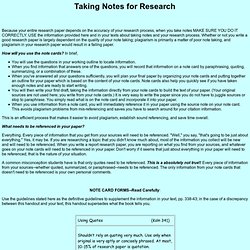
USE the information provided here and in your texts about taking notes and your research process. Whether or not you write a good research paper is largely dependent on the quality of your note taking; plagiarism is primarily a matter of poor note taking, and plagiarism in your research paper would result in a failing paper. How will you use the note cards? In brief, You will use the questions in your working outline to locate information.
What needs to be referenced in your paper? Everything. A common misconception students have is that only quotes need to be referenced. NOTE CARD FORMS--Read Carefully: Use the guidelines stated here as the definitive guidelines to supplement the information in your text, pp. 338-43; in the case of a discrepancy between this handout and your text, this handout supersedes what the book tells you. Research Guidelines: Notetaking. HUNTER COLLEGE READING/WRITING CENTER: DOCUMENTED ESSAY/RESEARCH PAPER Research Guidelines: Notetaking Notetaking is an indispensable part of writing a documented essay or research paper.
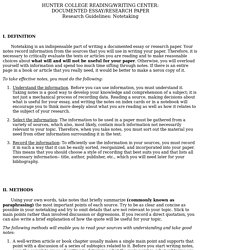
Your notes record information from the sources that you will use in writing your paper. Therefore, it is necessary to critically evaluate the texts or articles you are reading and to make reasonable choices about what will and will not be useful for your paper. Otherwise, you will overload yourself with information and spend too much time sifting through notes. If there is an entire page in a book or article that you really need, it would be better to make a xerox copy of it.
Taking Notes. Taking Notes How to Take NotesWhat to Put Into NotesHow to Use Idea CardsHow to Work with Notes How to Take Notes First of all, make sure that you record all necessary and appropriate information: author, title, publisher, place of publication, volume, span of pages, date.
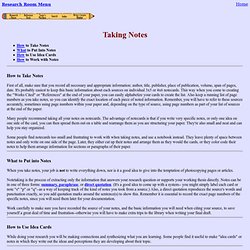
It's probably easiest to keep this basic information about each sources on individual 3x5 or 4x6 notecards. This way when you come to creating the "Works Cited" or "References" at the end of your paper, you can easily alphabetize your cards to create the list. Many people recommend taking all your notes on notecards. Some people find notecards too small and frustrating to work with when taking notes, and use a notebook instead. What to Put into Notes When you take notes, your job is not to write everything down, nor is it a good idea to give into the temptation of photocopying pages or articles. How to Use Idea Cards While doing your research you will be making connections and synthesizing what you are learning. Next Step. Main Page - PoIC. Luhmann on Learning How to Read. There are not many books or articles that purport to teach critical reading.
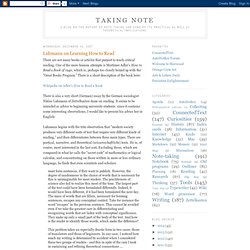
One of the more famous attempts is Mortimer Adler's How to Read a Book of 1940, which is, perhaps too closely bound up with the "Great Books Program. " There is a short description of the book here: Wikipedia on Adler's How to Read a Book There is also a very short (German) essay by the German sociologist Niklas Luhmann of Zettelkasten-fame on reading. It seems to be intended as advice to beginning university students. since it contains some interesting observations, I would like to present his advice her in English: Luhmann begins with the trite observation that "modern society produces very different sorts of text that require very different kinds of reading," and then differentiates between three main types.
Must form sentences, if they want to publish. This leads to another question: What do we do with what we have written down? Luhmann's Zettelkasten. Index cards played a large role in research during the last century -- the 20th century, that is.
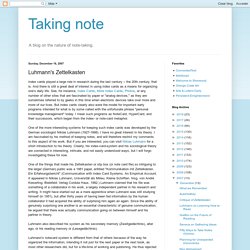
And there is still a great deal of interest in using index cards as a means for organizing one's daily life. See, for instance, Index Cards, More Index Cards, Photos, or any number of other sites that are fascinated by paper or "analog devices," as they are sometimes referred to by geeks in this time when electronic devices take over more and more of our lives. But index cards clearly also were the model for important early programs intended for what is by some called with the unfortunate phrase "personal knowledge management" today. I mean such programs as NoteCard, HyperCard, and their successors, which began from the index- or note-card metaphor.
One of the more interesting systems for keeping such index cards was developed by the German sociologist Niklas Luhmann (1927-1998). Instead, he opted for organisation by numbers. 21/3d26g53 for -- who else?